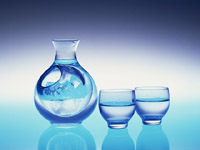 nigari
nigari
With so many different types of nigari available at different prices, how does one choose between them?
Here are some guidelines:
The main ingredient should be magnesium chloride. The amount of magnesium chloride should be over four grams per 100mls. There ought to be little sodium chloride. There are cases in which sodium chloride is the main constituent, as when nigari is made from deep sea water. However, Kameyamado employs the ion exchange dialysis method to make nigari, which removes most of the sodium. For more information, see 'Kameyamado's Nigari'.
Coping with oceanic pollutants
Nigari is made from condensed seawater, but these days seawater is increasingly polluted and present a health hazard. In particular, dioxins and heavy metals (mercury, lead, arsenic, aluminum etc.), if not completely removed, may be absorbed into the body. Our company uses the ion exchange dialysis method. The result is nigari that is completely free of dioxins and heavy metals. Our company’s mineral-abundant nigari has been made with your health in mind.
Why the difference in prices?
Nigari is after all made from the liquid left over from salt making, and hence not very expensive. As our company mass produces nigari, it is possible to offer low prices. With the current boom in Japan, various nigaris can be seen in the shops and some low priced products have appeared, but as the levels of concentration and production methods vary greatly, we advise you to check the list of ingredients. There are products on sale made from powdered nigari dissolved in water, but powdered nigari is nothing more than magnesium chloride. It is highly important that real nigari contains a balance of various minerals.
I’ve heard that there are diluted nigaris, how about the level of strength?
There are companies that selli nigari diluted in water, but our company sells nigari in its natural liquid form. There are those who assume that a high price means a high level of strength, but this is not so. Our nigari is comparatively low in price but this is because it is mass produced. Due to production with the ion exchange filters, the tiny-sized ions give an extremely high level of strength. Constituent analysis is also regularly carried out.
A difference in service
As previous customers already know, those who buy our nigari receive a free empty mini portable bottle, as well as a reference sheet explaining in detail the uses of nigari as well as other information about nigari. We began to implement these services after receiving feedback on such points as the difficulty of pouring one drip at a time or not knowing how best to use nigari.